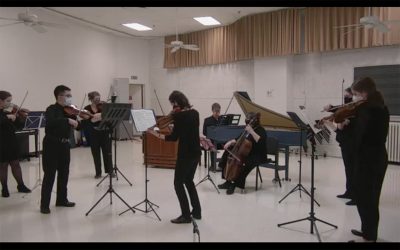Molly Tucker was likely experiencing many emotions before she arrived to perform for the Boston University Baroque Orchestra Tuesday evening. At first, a “frenetic energy” made her question if she was ready, but one that eventually propelled her on stage.

Following that energy jolt was a “calm focus” that surrounded her as she started to play, only becoming more pronounced when she was on stage with other performers harboring a genuine connection through the music.
Throughout this musical experience, even in the midst of social distancing and mask requirements, Tucker has experienced both out-of-body relief and a very grounded presence. Though the world has made creating these emotional ties more challenging, for Tucker, music has still been the gateway to such connection.
“As a practice of preparation or connecting to the music, sometimes I think about the emotional quality of what I’m playing,” Tucker said, “and use experiences or memories or people that I know to help inform the emotional connection that I have to a piece.”
Tucker, alongside seven other players, performed a series of six pieces via livestream on the BU CFA School of Music website Tuesday. With multiple camera angles and microphones, the stream provided viewers with a near real experience of an in-person musical performance.
The essence of baroque is found in smaller, more intimate settings, and that was highlighted by the interchanging arrangements, both in size and instruments used.
“The experience of doing it this way, I’m very very very lucky that we are all in the same room together,” said Jane Starkman, the director of the orchestra.
Starkman, who is also a lecturer in the historical performance department in the SoM, said the program contained both 17th and 18th century music, but all on baroque instruments, including violins, cellos, violas, harpsichords and organs.
Yet the role of the event and the department in which the class falls under is different from a typical musical performance, she said.
The BU Baroque Orchestra is a project-based, one-credit College of Fine Arts class that provides experienced students with opportunities to perform alone and in a group.
Starkman described the show and the historical performance department as “playing the music of Renaissance and Baroque on the period instruments, the instruments of the time,” and emulating what is believed to have been the arrangement of performers from that period.
Some of the instruments used in the performance were retrofitted, while others were built to be baroque instruments, she said.
Starkman added that some differences between a baroque violin and more modern variations including a difference in strings, bridges and types of bow — all designed to “create less tension on the instrument.”
“What we’re playing tonight would have been music that would have been meant to play in churches, chapels, things like that,” she said, “smaller, more intimate spaces.”
The performance took place in room 171 of the CFA building on BU’s campus, where rehearsal for the orchestra also takes place. Due to new measures to keep students and faculty safe, the room contains air filters and performers must remain six feet apart.
“For the School of Music to have the orchestras playing,” said James Burton, the director of orchestral activities and a master lecturer in SoM in the event recording, “it’s almost miraculous because of the challenges we’ve faced in order to get to that point.”
Burton said SoM colleagues have been adjusting and working hard to teach “as fully as we possibly can” in the face of these difficulties. Burton said these creative solutions have been a testament to music’s creativity and perseverance.
However, Tucker noted that despite challenges such as difficulty hearing across distances or concealed facial expressions behind masks, the new environment actually yielded benefits for the musicians’ setup since there was better resonance in a smaller room with the baroque instruments, as opposed to a concert hall.
“For one, I feel really lucky that I get to make music, because a lot of people I know who aren’t in school or aren’t here don’t have opportunities to safely make music,” Tucker said. “But definitely, the configuration has presented its own challenges.”
A typical baroque orchestra, Starkman said, is a lot more close and personal.
“Normally string players share stands, and so you’re playing right next to each other,” Starkman said. “When you’re playing next to each other, you’re blending into each other’s sound, you’re feeling each other’s breath.”
Starkman, who was hired in 2004 to teach chamber music at BU and has been performing for years, noted that she’s devoted half of her professional life to performance.
The unforeseen changes in the past year has placed a toll on her role as musician. When reflecting on what music means to her and how the pandemic has affected that, Starkman felt her career before the pandemic was taken for granted.
“I think what it’s done is make me appreciate my life as a performer more,” Starkman said. “I feel a loss, I feel a void that I haven’t been able to do this.”
The meaning of music differs for Tucker, who is just launching her performance career. When visiting a music festival one summer as a teenager, Tucker decided to be “intentional” about playing music.
“I wanted to choose music,” Tucker said.
Now years later, she has begun the fulfillment of her prophecy in this new environment, performing as part of an ensemble to a virtual audience.
“It’s still super powerful to be able to make music,” she said. “Even when it’s always … changing.”






















































































































